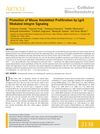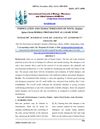 October 2023 in “IntechOpen eBooks”
October 2023 in “IntechOpen eBooks” Genes and epigenetic changes are important in the development of Polycystic Ovary Syndrome.
[object Object]  7 citations,
April 2013 in “Journal of Cellular Biochemistry”
7 citations,
April 2013 in “Journal of Cellular Biochemistry” CD61 is important for mouse tooth cell growth and works through Lgr5.
 883 citations,
August 2016 in “Nature Reviews Disease Primers”
883 citations,
August 2016 in “Nature Reviews Disease Primers” Polycystic Ovary Syndrome (PCOS) is a common condition in women that can cause metabolic, reproductive, and psychological issues, and requires lifestyle changes and medication for management.
 159 citations,
October 2015 in “Science Advances”
159 citations,
October 2015 in “Science Advances” Blocking JAK-STAT signaling can lead to hair growth.
 54 citations,
November 2017 in “Scientific Reports”
54 citations,
November 2017 in “Scientific Reports” The study found that certain microRNAs are higher in the cells and lower in the fluid of women with a specific type of polycystic ovary syndrome, and one microRNA could potentially help diagnose the condition.
 47 citations,
August 2014 in “The Journal of Clinical Endocrinology and Metabolism”
47 citations,
August 2014 in “The Journal of Clinical Endocrinology and Metabolism” The research suggests that the global distribution of PCOS is likely due to historical human migration and that genes affecting PCOS may have different impacts on males and females.
 29 citations,
March 2020 in “Stem Cell Research & Therapy”
29 citations,
March 2020 in “Stem Cell Research & Therapy” Fat stem cells from diabetic mice can help heal skin wounds in other diabetic mice.
 25 citations,
September 2014 in “Biological Research”
25 citations,
September 2014 in “Biological Research” Arctiin helps protect hair cells from damage and death caused by oxidative stress.
 19 citations,
April 2015 in “Stem Cells”
19 citations,
April 2015 in “Stem Cells” Pro-IGF-II improves muscle repair in old mice.
 16 citations,
September 2018 in “Clinical Biochemistry”
16 citations,
September 2018 in “Clinical Biochemistry” The document concludes that more research is needed to fully understand the causes of PCOS.
 15 citations,
August 2020 in “American Journal of Pathology”
15 citations,
August 2020 in “American Journal of Pathology” Insulin helps heal corneal wounds and nerves in diabetic mice by activating the Wnt signaling pathway.
[object Object]  12 citations,
May 2016 in “British Journal of Dermatology”
12 citations,
May 2016 in “British Journal of Dermatology” AGA progression involves increased lipid synthesis, electron transport, and hair follicle miniaturization.
 12 citations,
May 2015 in “Molecular Medicine Reports”
12 citations,
May 2015 in “Molecular Medicine Reports” Troxerutin helps protect skin cells from oxidative stress and may be good for treating hair loss.
 4 citations,
July 2019 in “Children (Basel)”
4 citations,
July 2019 in “Children (Basel)” The review concludes that more research is needed to better improve the health outcomes for people with Polycystic Ovarian Syndrome.
 3 citations,
February 2018 in “InTech eBooks”
3 citations,
February 2018 in “InTech eBooks” Traditional Chinese Medicine and acupuncture may improve Polycystic Ovarian Syndrome symptoms and reduce costs, but more research is needed.
 2 citations,
December 2019 in “Journal of The European Academy of Dermatology and Venereology”
2 citations,
December 2019 in “Journal of The European Academy of Dermatology and Venereology” Differences in gene expression and methylation patterns found in AGA patients suggest potential targets for future treatments.

PCOS has a strong genetic basis, but more research is needed to fully understand it.
 July 2024 in “Frontiers in Pharmacology”
July 2024 in “Frontiers in Pharmacology” Pilose antler extracts help hair growth by activating hair follicle stem cells.

New insights into cell communication in psoriasis suggest innovative drug treatments.
6 citations,
December 2021 in “International Journal of Endocrinology” The genetic variant studied does not affect PCOS symptoms in Kashmiri women.

Women with Polycystic Ovary Syndrome (PCOS) have a higher risk of developing type 2 diabetes due to insulin resistance.
Curcuma aeruginosa Roxb. may help treat hair loss by affecting specific biological pathways.
December 2023 in “Animals” The research found genes and miRNAs that may control hair growth in Forest Musk Deer.
November 2023 in “Biology” N6-methyladenosine affects hair follicle development differently in Rex and Hycole rabbits.
 24 citations,
May 2015 in “Schizophrenia Research”
24 citations,
May 2015 in “Schizophrenia Research” A drug improved schizophrenia-like symptoms in stressed rats by changing brain steroid levels.
 November 2022 in “International journal of biology, pharmacy and allied sciences”
November 2022 in “International journal of biology, pharmacy and allied sciences” The new herbal shampoo is effective, safe, and more affordable than other products.
 February 2023 in “International Journal of Advanced Research in Science, Communication and Technology”
February 2023 in “International Journal of Advanced Research in Science, Communication and Technology” Herbal shampoos with Neem and Tulsi might be safer and more effective for controlling dandruff.























